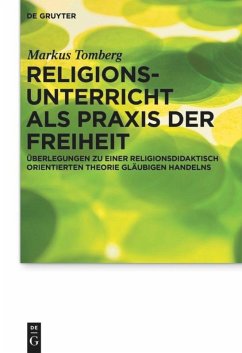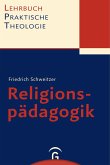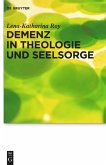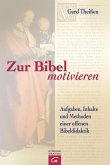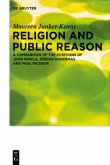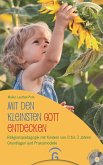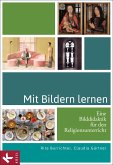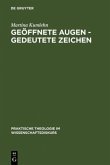Current discussions on the meaning and objective of religious education in schools are also debating the denominational profile of such education. This study aims to determine this profile more precisely by defining religious didactics as part of the exercise of Christian faith. Thus, the study not only links religious learning with the Christian practice of faith but also provides guidance in determining and ascertaining this practice of faith in learning processes. In doing so, the study makes a statement from a Catholic perspective on the learnability of faith.
Die Frage der Lernbarkeit des Glaubens gehört zu den konstitutiven Problemen christlicher Religionsdidaktik. Sie ist unabhängig von einer Klärung des Selbstverständnisses christlichen Glaubens nicht lösbar. Bearbeiten lässt sie sich durch die Interpretation religiösen Lernens als Praxis des Glaubens, den der Autor im Anschluss an Th. Pröpper als Tun der Freiheit versteht. Religionsdidaktik und die von ihr beschriebenen Lernprozesse lassen sich so gerade im Religionsunterricht - einem locus theologicus (H.-J. Sander)! - als eine Praxis des Glaubens theologisch fokussieren und analysieren. Auf diese Weise wird es möglich, ein nicht-extrinsezistisches, bildungstheoretisch anschlussfähiges Konzept christlichen Glauben-Lernens zu entwickeln.
Profiliert wird dieses Projekt einer didaktisch orientierten Theorie gläubiger Praxis in der Auseinandersetzung mit diversen Vorschlägen zur Gestaltung und Zielsetzung religiösen Lernens (P. Biehl, R. Boschki, H. Halbfas, L. Kuld, N. Mette,Th. Ruster, I. Schoberth, J. Werbick u.a.). Es mündet in den Versuch, religiöses Lernen im konfessionellen Religionsunterricht in der Schule als Praxis der Freiheit zu beschreiben.
Die Frage der Lernbarkeit des Glaubens gehört zu den konstitutiven Problemen christlicher Religionsdidaktik. Sie ist unabhängig von einer Klärung des Selbstverständnisses christlichen Glaubens nicht lösbar. Bearbeiten lässt sie sich durch die Interpretation religiösen Lernens als Praxis des Glaubens, den der Autor im Anschluss an Th. Pröpper als Tun der Freiheit versteht. Religionsdidaktik und die von ihr beschriebenen Lernprozesse lassen sich so gerade im Religionsunterricht - einem locus theologicus (H.-J. Sander)! - als eine Praxis des Glaubens theologisch fokussieren und analysieren. Auf diese Weise wird es möglich, ein nicht-extrinsezistisches, bildungstheoretisch anschlussfähiges Konzept christlichen Glauben-Lernens zu entwickeln.
Profiliert wird dieses Projekt einer didaktisch orientierten Theorie gläubiger Praxis in der Auseinandersetzung mit diversen Vorschlägen zur Gestaltung und Zielsetzung religiösen Lernens (P. Biehl, R. Boschki, H. Halbfas, L. Kuld, N. Mette,Th. Ruster, I. Schoberth, J. Werbick u.a.). Es mündet in den Versuch, religiöses Lernen im konfessionellen Religionsunterricht in der Schule als Praxis der Freiheit zu beschreiben.

